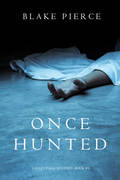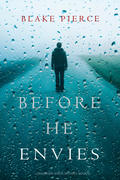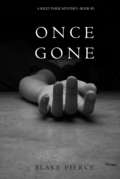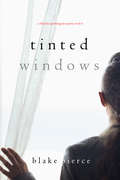
Блейк Пирс
The Perfect Wife
CHAPTER THREE
Five minutes later, with Jessie still silently seething, they walked into the lobby of the Club Deseo, getting some much-needed air-conditioned relief from the already warm day. Jessie looked around, taking the place in. She couldn’t help but think that the name, which according to Teddy meant “Club of Wishes,” was a little grandiose, considering what was in front of her.
She’d almost missed the club’s entrance, a large, unmarked, weathered oak door attached to a modest-looking structure on the quieter edge of the harbor. The lobby itself was nondescript, with a simple hostess stand currently manned by a gorgeous, industrious-looking brunette in her early twenties.
Teddy leaned over and spoke to her quietly. She nodded and indicated for the group to pass through a small hallway. It was only when another, equally beautiful young blonde woman asked her to put her purse in a basket that Jessie realized the hall also doubled as a classy metal detector.
Once through the hallway, the woman returned her bag and indicated that she should follow the others through a second wood-paneled door that seemed to blend into the wall beside it. If she’d been alone, she might have missed the door completely.
After they stepped through that second door, all the modesty of the building’s lobby quickly faded away. The cavernous circular room she was staring at had two levels. The top, where she was, had tables encircling and looking down on the lower level, which was accessed by a wide staircase.
The lower level had a small central dance floor surrounded by multiple tables. The entire place looked to have been designed using repurposed wood from old sailing vessels. Planks right beside each other, which comprised the walls, had different grades and colors. The hodgepodge shouldn’t have worked but somehow did, giving the space a nautical vibe that felt reverential, not shticky.
At the far end of the room was the most impressive feature. The entire ocean-facing side of the club was comprised of a massive glass window, half of which was above water, half below. Depending on where one sat, the view could be of the horizon or schools of fish swimming below the surface. It was incredible.
They were led to a large table on the lower level, where a group of about fifteen people awaited them. Teddy and Mel introduced them around but Jessie didn’t even try to remember the names. She learned that there were four couples, with about seven children split among them.
Instead, she smiled and nodded politely as each of them pummeled her with more information than she could process.
“I’m in social media marketing,” someone named either Roger or Richard told her. He fidgeted constantly and picked his nose when he thought no one was looking.
“We’re choosing wall rugs right now,” said the woman next to him, a brunette with blonde streaks in her hair who may or may not have been his wife but who definitely had eyes for the tan guy across the table.
It went on like that. Mel introduced someone. Jessie made no serious attempt to remember their name but instead tried to glean something about their true nature based on their looks, body language, and speaking style. It was a kind of game, one she employed often in uncomfortable situations.
After the introductions, two more pretty young girls swept in and collected all the kids, including Daughton, to take them to Pirate’s Cove, which one of the wives told her was the name of the youth fun zone. Jessie assumed it must have been pretty great because every child left without even a hint of separation anxiety.
Once they were gone, the meal proceeded much as Mel had warned her. Two women who were either twins or looked so similar that they might as well have been, told a story about a religious summer camp that was primarily about the terrible singing voice of the praise leader.
“She sounded like she was about to give birth,” one of them said as the other cackled appreciatively. To the extent that she paid any attention, Jessie got lost as they interrupted and spoke over each interminably.
A guy with a shock of long curly hair and a bolo tie he was way too enamored with recounted the particulars of a hockey game he’d attended last spring. But there was nothing memorable about it. The entire five-minute story was comprised of who scored goals when. Jessie kept waiting for a twist, like when an octopus was thrown on the ice or a fan jumped the wall. But there was no twist.
“Anyway, it was an awesome game,” he finally concluded, which she knew was her cue to smile appreciatively.
“Best. Story. Ever,” Mel said dryly under her breath, giving Jessie her only happy moment so far and something close to a second wind.
Much of the conversation was consumed with discussion of various upcoming club events, including the Halloween Bash, the Bringing the Boats in Party (whatever that was) and the Holiday Ball.
“What’s the Bringing in…” she started to ask before being cut off by the woman two seats down shrieking when a waiter accidentally knocked a glass of water over, getting a few drops on her.
“Bitch,” she muttered way too loud after the server had left. Soon thereafter, all the men got up, kissed their wives, and said goodbye. Kyle gave Jessie a perplexed look but followed suit.
“I guess I’ll see you later?” he asked more than said.
She nodded politely, though she was equally confused. It felt like they were in that scene from Titanic, when all the menfolk left after dinner to discuss business and politics over brandy in the smoking room.
Jessie watched as the guys wandered among the tables until they reached an ornate wooden door in the corner of the room with a muscular, humorless man standing in front of it. He looked like a bouncer at a nightclub, only he wore a tuxedo. As the guys from their table approached, he stepped aside to let them pass. He seemed to give Kyle a skeptical glance until Teddy murmured something to him. The bouncer nodded and smiled at Kyle.
The rest of the brunch went by in a whirlwind. As Mel had promised, the conversation centered around children and children-to-be, as at least two of the women in the group were clearly pregnant.
“I’m just gearing up to bitch-slap the next barista who gives me a dirty look when I’m breastfeeding,” one named either Katlyn or Kaitlyn said. “I was way too accommodating after Warner was born.”
“Threaten to sue,” Brunette with Blonde Streaks said. “I did that and got a hundred-dollar gift certificate as an apology. The best part was that no one had done anything wrong. I just complained about an ‘environment of discomfort.’”
Jessie was the only non-mother at the table but tried to join in the discussion, asking polite questions about the local elementary school (“a dump”) versus the private one they all seemed to send their kids to.
As Jessie listened to the disagreements about the top daycare and preschool options and the general consensus about the best supermarket, she felt her mind wander. She pinched herself under the table a few times as opinions were voiced on good churches, the best local gym, and where to find a great dress for the Holiday Ball.
But eventually, she gave up trying to keep track of who was saying what, or even offering bland affirmations, and settled into the role of passive observer, as if she were watching the social behavior of some unusual species in the wild.
Is this the life I’ve committed to? Lunches with ladies that focus on which gym has the best spinning class? Is this the world Kyle has been jonesing to become a part of? If so, just kill me now.
At some point, she realized Mel was tapping her on the shoulder to let her know brunch was over and that she needed to collect Daughton. Apparently Teddy and Kyle would be meeting them in the lobby.
Jessie nodded, said gracious goodbyes to the women whose names she couldn’t remember, and blankly followed Mel to Pirate’s Cove. She felt disoriented and exhausted and wanted nothing more than to go home, take a bath, have a glass of wine, and go to sleep. She glanced at her watch and was stunned to discover that it wasn’t even 1 p.m.
*
She didn’t get to decompress until hours later. After the walk back to the Carlisle house and the obligatory hangout there for a while, they finally headed back home. But not before a pit stop to Costco for essentials. Jessie imagined the disapproving faces of her brunch companions.
Later that night as she washed her face while Kyle brushed his teeth, they had recovered enough to debrief the day a bit.
“What happened in the secret room you went off to?” she asked. “Did they make you strip to your undies and give you ten lashes?”
“I was actually a little worried about what was behind that door,” Kyle admitted as they moved into the bedroom. “But it turned out to be essentially a really well-appointed sports bar. They had games on the TVs, a waiter walking around taking drink orders, and a few guys changing into or out of golf attire.”
“So no smoking room with brandy?” she asked, wondering if he’d get the reference.
“Not that I saw, although I did notice Leonardo DiCaprio wandering aimlessly through the dressing room.”
“Nice job, husband,” Jessie said appreciatively as she got into bed. “You’ve still got it.”
“Thank you, wife,” he replied, sliding under the covers next to her. “Actually, I heard there was a cigar room in there somewhere but I didn’t go looking for it. I think it’s hidden away in some corner that’s exempt from the club’s ‘no smoking’ rules. But I bet I could have gotten a brandy if I’d asked.”
“Meet anyone interesting?” she asked skeptically as she turned off the bedroom light.
“Surprisingly, yes,” he said. “They were all pretty cool. And since two of them were looking for potential investments, that made them interesting to me. I think that club could be a real resource for business leads. You?”
“Everyone was very nice,” Jessie said hesitantly, hoping the darkness of the room hid her furrowed brow. “Very friendly with all kinds of offers of help with anything I need.”
“Why do I hear a ‘but’ in there?”
“No. It’s just that not once in the time I was with them alone did one of those women talk about anything other kids, school, or family. No mention of their jobs or current events. It just felt very provincial.”
“Maybe they just wanted to avoid controversial topics at a brunch with someone new?” Kyle suggested.
“Jobs are controversial these days?”
“I don’t know, Jessie. Are you sure you’re not reading too much into an innocent gathering?”
“I’m not suggesting they’re Stepford Wives or anything,” she insisted. “But other than Mel, they were relentlessly narcissistic. I’m not sure that any of them ever give more than a passing thought to the world outside their windows. I’m just saying that after a while, it started to feel a little…claustrophobic.”
Kyle sat up in bed.
“That phrasing sounds familiar,” he said, concern in his voice. “Don’t get pissed at me. But the last time you talked about feeling claustrophobic was when—”
“I remember the last time,” she interrupted, annoyed. “This isn’t the same.”
“Okay,” he replied delicately. “But you’ll understand if I ask if you’re comfortable with your meds these days. Is the dosage still working? Do you think maybe you should schedule an appointment with Dr. Lemmon?”
“I’m fine, Kyle,” she said, getting out of bed. “Not everything is about that. Can’t I express some reservations without you jumping to conclusions?”
“Of course,” he said. “I’m sorry. Please come back to bed.”
“I mean, seriously. You weren’t there. While you were off chilling with the boys, I had a plastic smile on my face while these women talked about shaking down coffee shops. That’s not a medication issue. It’s a ‘these chicks are awful’ issue.”
“I’m sorry, Jess,” he repeated. “I shouldn’t have assumed it was the meds.”
Jessie looked at him, torn between wanting to forgive him and wanting to rip him a little more. She decided not to do either.
“I’ll be back in a few minutes,” she said. “I just need to decompress. In case you’re asleep when I get back, I’ll say goodnight now.”
“Okay,” he said reluctantly. “Goodnight. I love you.”
“Goodnight,” she said, giving him a kiss despite her lack of enthusiasm at that moment. “I love you too.”
She left the bedroom and wandered the house, waiting for her frustration to dissipate as she moved from room to room. She tried to put his dismissiveness out of her head but it kept sneaking back in, riling her up despite her best efforts.
She was just calming down enough to head back to bed when she heard the same distant creaking noise from the other night. Only tonight it wasn’t so distant. She followed the sound until she found what she thought was the source—the attic.
She had come to a stop in the upstairs hallway right below the attic access door. After a moment’s hesitation, she grabbed the string to the door and yanked it down. The creaking definitely sounded more pronounced.
She clambered up the access ladder as quietly as she could, trying not to think about how this sort of decision always ended badly in horror movies. When she got up the stairs, she pulled out her phone and used the flashlight feature to search the space. But apart from a few aged, empty cardboard boxes, the space was empty. And the creaking had stopped.
Jessie carefully climbed back down, replaced the ladder, and, too amped to sleep, resumed her restless wandering. Eventually, she found herself in the bedroom they anticipated using for the baby, when and if one ever joined them.
It was empty now but Jessie could picture where the crib would go. She imagined it against the far wall, with a mobile dangling above it. She rested her back against the wall and slid down so that she was sitting with her knees in front of her face. She wrapped her arms around them and hugged tight, trying to reassure herself that life in this new strange place would be better than it seemed so far.
Am I reading this all wrong?
She couldn’t help but wonder if maybe her meds did need to be tweaked. She wasn’t sure if she was being too hard on Kyle or if she was judging the Club Deseo women too harshly. Was the fact that Kyle was adjusting so easily to this place and she wasn’t a reflection of his adaptability, her brittleness, or both? He already seemed at home, as if he’d lived here for years. She wondered if she’d ever reach that point.
She wasn’t sure if she was just nervous because her last semester of classes started up tomorrow and she’d have to dive back into the world of studying rapists, child predators, and murderers. And she wasn’t sure if that creak she kept hearing was real or in her head. At this moment, she wasn’t sure of much of anything. And it scared her.
CHAPTER FOUR
Jessie was short of breath and her heart was palpitating. She was late for class. This was her first time on the campus of the University of California at Irvine and finding her classroom had been daunting. After running the last quarter mile across campus in the sweltering mid-morning heat, she barreled through the door. Her forehead was beading with sweat and her top felt slightly damp.
Professor Warren Hosta, a tall, thin, fifty-something man with narrow, suspicious eyes and a lone, sad tuft of grayish-black hair on top of his head, had clearly been mid-sentence when she burst in at 10:04 a.m. She’d heard rumors about his impatience and generally churlish demeanor and he didn’t disappoint. He stopped and waited for her to find her seat, staring at her the whole time.
“May I resume?” he asked sarcastically.
Great start, Jessie. Way to make a first impression.
“Sorry, Professor,” she said. “The campus is new to me. I got a little turned around.”
“I hope your skills at deduction are stronger than your sense of direction,” he replied superciliously before returning to his lecture. “As I was saying, for most of you, this will be your final course before securing your master’s degree in Forensic Psychology. It will not be a walk in the park.”
Jessie unzipped her backpack as quietly as possible to pull out a pen and notebook but the sound of the zipper passing along every tooth seemed to resonate in the room. The professor glanced at her out of the corner of his eye but didn’t stop speaking.
“I will pass out the syllabus momentarily,” he said. “But in general, this is what is expected of you. In addition to the standard course work and associated exams, those of you who have yet to complete one will submit and defend your thesis. In addition, everyone—completed thesis or not—will have a practicum. Some of you will be assigned to a correctional facility, either the California Institute for Men in Chino or the California Institute for Women in Corona, both of which house a number of violent offenders. Others will visit the high-risk unit at DSH-Metropolitan, which is a state hospital in Norwalk. They treat patients commonly referred to as ‘criminally insane,’ although local community concerns prevent them from accepting patients with a history of murder, sex crimes, or escape.”
An unspoken current of electricity passed through the room as the students all glanced around at each other. This was what they’d been waiting for. The rest of the lecture was fairly straightforward, with a description of their course work and details on writing their theses.
Luckily, Jessie had completed and defended hers while at USC, so she didn’t pay much attention to that discussion. Instead, her mind returned to the odd brunch at the yacht club and how, despite everyone’s warmth and generosity, she’d felt unsettled by it.
It was only when talk returned to the practicums that she really focused back in. Students were asking logistical and academic questions. Jessie had one of her own but decided to wait until after class. She didn’t want to share it with the group.
Most of her classmates clearly wanted to work at one of the prisons. The mention of a community ban on violent offenders at the Norwalk hospital seemed to limit its popularity.
Eventually Professor Hosta signaled the end of class and folks started to file out of the room. Jessie took her time returning her notebook to her backpack while a few students asked Hosta questions. It was only when they were all gone and the professor himself was starting to walk out that she approached him.
“Sorry again for the late arrival, Professor Hosta,” she said, trying not to sound too obsequious. Over the course of just one class, she’d gotten the strong sense that Hosta despised spineless groveling. He seemed to prefer inquisitiveness, even if it bordered on rudeness, to deference.
“You don’t sound very apologetic, Ms.…” he noted with a raised eyebrow.
“Hunt, Jessie Hunt. And I’m not really,” she admitted, deciding in that moment that she’d have more success with this guy if she was straightforward. “I just figured I needed to be polite in order get an answer to my real question.”
“Which is…?” he asked, his eyebrows raised in intrigued surprise.
She had his attention.
“I noticed you said that DSH-Metro doesn’t accept patients with a history of violence.”
“That’s correct,” he said. “It’s their policy. I was basically quoting from their website.”
“But Professor, we both know that’s not entirely accurate. The Norwalk hospital does have a small section cordoned off to treat patients who have committed some horrifically violent crimes, including serial murder, rape, and assorted transgressions against children.”
He stared at her impassively for a long moment before responding.
“According to the Department of State Hospitals, DSH-Atascadero up in San Luis Obispo handles those cases,” he replied stone-faced. “Metro deals with nonviolent offenders. So I’m not sure what you’re referencing.”
“Of course you are,” Jessie said more confidently than she’d expected. “It’s called the Non-Rehabilitative Division, or NRD for short. But that’s just the boring term they use for public consumption. Internally and within criminal justice circles, NRD is known as the ‘high-risk’ unit at DSH-Metro, which I happened to notice is the term you used to describe it in class.”
Hosta didn’t respond. Instead, he studied her inscrutably for several seconds before finally allowing his face to break into a slight grin. It was the first time she’d seen anything close to a smile from him.
“Walk with me,” he said, motioning for her to exit the room. “You win the special prize, Ms. Hunt. It’s been three semesters since a student last picked up on my little bit of verbal trickery there. Everyone is so turned off by the community standards bit that no one wonders what the reference to ‘high-risk’ is all about. But it’s clear that you were familiar with NRD long before entering class today. What do you know about it?”
“Well,” she began carefully, “I did the first several semesters of my study at USC and NRD is kind of an open secret there, what with them being so close.”
“Ms. Hunt, you are dissembling. It is not an open secret. Even within law enforcement and the psychiatric community, it is a tightly guarded one. I’d hazard that fewer than two hundred people in the region are aware of its existence. Less than half of them know the full nature of the facility. And yet, somehow, you do. Please explain yourself. And this time, let’s drop the careful coyness.”
Now it was Jessie’s turn to decide whether to be forthcoming.
You’ve come this far. May as well take that final leap.
“I did my thesis on it,” she said. “It almost got me kicked out of the program.”
Hosta stopped walking and looked briefly stunned before regaining his composure.
“So that was you?” he asked, sounding impressed as he started back down the hall. “That thesis is legendary among those who have read it. If I recall, the title was along the lines of ‘The Impact of Non-Rehabilitative Long-Term Incarceration on the Criminally Insane.’ But no one could figure out who the real author was. After all, there is no official record of ‘Jane Don’t.’”
“I have to admit I was pretty proud of that name. But using a fake one at all wasn’t my decision,” Jessie admitted.
“What do you mean?” Hosta asked, clearly intrigued.
Jessie wondered if she was skirting the edge of what she was allowed to discuss. But then she remembered the reason she was assigned to work with Hosta in the first place and decided there was no reason to be coy.
“My faculty adviser submitted the thesis to the dean,” she explained. “He promptly brought in several law enforcement and medical folks I’m not allowed to mention other than by the charming term ‘The Panel.’ I was questioned for nine straight hours before they determined that I was sincerely writing an academic paper and not secretly some reporter or worse.”
“That sounds exciting,” Hosta said. He seemed to mean it.
“It sounds it. But at the time, terrifying was a more appropriate word. Eventually they decided not to arrest me. After all, they had the off-book, secret psychiatric lockup, not me. The school agreed that I hadn’t done anything technically wrong and agreed not to dump me, although everything about the thesis was declared classified. The department determined that my interrogation by authorities could serve as my thesis defense. And I signed several documents promising not to discuss the matter with anyone, including my husband, or face potential prosecution, although for what charge they never said.”
“Then how is it, Ms. Hunt, that we are having this conversation?”
“I received a…let’s call it a special dispensation. I was permitted to continue to pursue my degree and set a specific condition. But in order to complete it, my new faculty adviser would have to be made at least superficially aware of what I’d written. The powers that be looked at the faculty at every university in Orange County and determined that you alone met their requirements. The school has a master’s program in Criminal Psychology, which you direct. You have a relationship with NRD and have done field work there. You even have it as a practicum option set up there in rare instances where a student expresses interest and shows promise. You’re my only option for fifty miles in any direction.”
“I suppose I should be flattered. And what if I decline to be your faculty adviser?” he asked.
“You should have received a visit from someone representing The Panel to address all this—how it would be in your best interest, etc. I’m surprised you haven’t. They’re usually pretty thorough.”
Hosta thought for a second.
“I have received several emails and a voice message recently from someone named Dr. Ranier,” he said. “But the name wasn’t familiar so I ignored them.”
“I recommend you return the message, Professor,” Jessie suggested. “It’s possible that it’s a pseudonym, maybe for someone you already know.”
“I’ll do that. In any case, I gather that I won’t have to jump through all the usual bureaucratic hoops to get you authorized to do your practicum at NRD?”
“Doing it there was the specific condition I mentioned earlier. It’s the reason I agreed without much fuss to their non-disclosure agreement,” Jessie told him, unable to keep the excitement out of her voice. “I’ve been waiting almost two years for this.”
“Two years?” Hosta said, surprised. “If you completed your thesis that long ago, shouldn’t you have your degree by now?”
“That’s a long story I’ll have to share some other time. But for now, can I assume I have your authorization do my practicum at DSH-Metro, specifically in NRD?”
“Assuming your story checks out, yes,” he said as they reached his office door. He unlocked it but didn’t invite her in. “But I have to pose the question I raise with any student who requests to do their field work there—are you sure you want to do this?”
“How can you ask me that, given everything I’ve told you?”
“Because it’s one thing to read about the people being held at that facility,” he answered. “It’s quite another to interact with them. It gets real very fast. I gather from the redactions in your thesis that you know about some of the inmates being housed there?”
“A few; I know that the serial rapist from Bakersfield, Delmond Stokes, is being held there. And the multiple child murderer who was captured last year by that retired lady cop is there as well. And I’m pretty sure Bolton Crutchfield is being held there too.”
Hosta stared at her, as if deciding whether or not to say what he was thinking. Finally he seemed to make a decision.
“That’s who you want to observe, isn’t it?”
“I have to admit, I’m curious,” Jessie said. “I’ve heard all kinds of stories about him. I’m not sure how many of them are true.”
“One story I can assure you is true is that he brutally murdered nineteen people over half a dozen years. Whatever else is truth or legend, that is a fact. Don’t ever lose sight of it.”
“Have you met him?” Jessie asked.
“I have. I interviewed him on two occasions.”
“And what was that like?”
“Ms. Hunt, that’s a long story I’ll have to share some other time,” he said, turning her own words back on her. “For now, I will reach out to this Dr. Ranier and check your bona fides. Assuming that goes without incident, I’ll contact you to set up your practicum. I know you’ll want to start soon.”
“I’d go tomorrow if I could.”
“Yes, well, it might take a bit longer than that. In the meantime, try not to bounce off the walls. Good day, Ms. Hunt.”
And with that he shut the door to his office, leaving Jessie in the hall. She turned to leave. Looking around the unfamiliar hallway, she realized she’d been so immersed in the conversation that she hadn’t paid attention to anything else. She had no idea where she was.
She stood there for a moment, imagining herself sitting face to face with Bolton Crutchfield. The thought both excited and terrified her. She had wanted—no, needed—to talk to him for a while now. The possibility that it might soon happen made her tingle with anticipation. She needed answers to questions no one even knew she had. And he was the only one who could provide them. But she wasn’t sure if he would. And even if he was willing, what might he demand in return?







